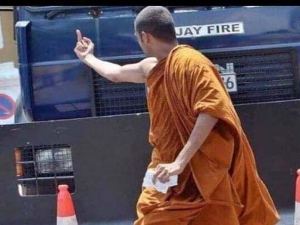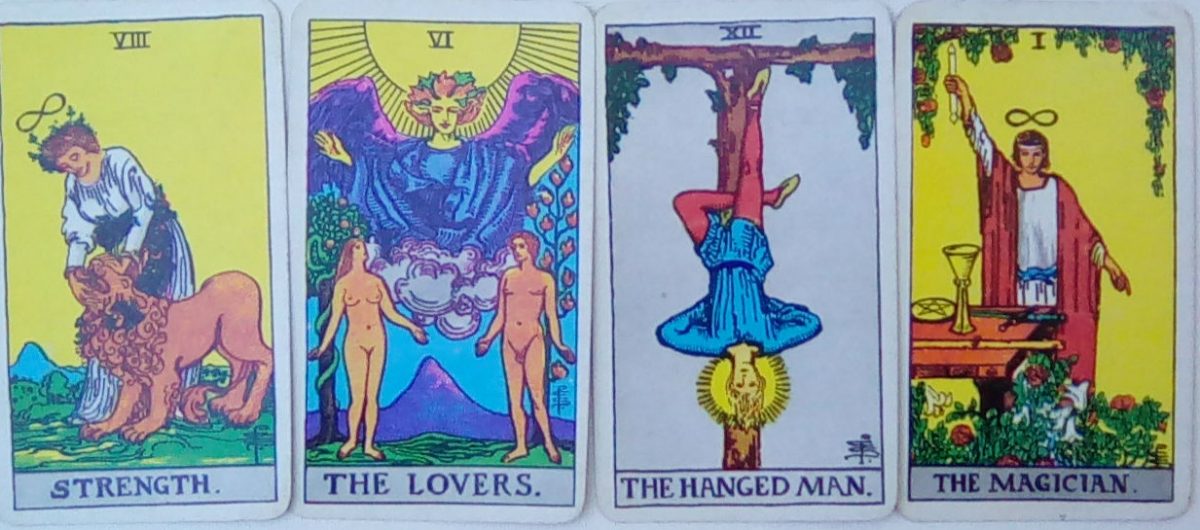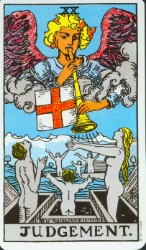The Dalai Lama giggles a lot. Have you ever noticed that? On a certain level, he seems to find life to be absolutely hilarious. For instance, there’s this wonderful interview that Barbara Walters did with him and, toward the end of the video, he absolutely cracks up about the fact that Eskimos kiss each other by rubbing noses.
It seems a little strange because Buddhism has a reputation for being a very dark, solemn sort of a religion. That reputation probably flows out of the Buddha’s admonition that, “life is suffering,” which is not exactly what he said, but it’s the way that it’s frequently translated. So we have this religious doctrine that seems to say that life is suffering, yet we see Buddhists like the Dalai Lama and Thic Nhat Hahn who not only seem to be happy, they seem to be really, really, REALLY happy.
What’s up with that?

The tarot card, The Hierophant, is all about formal doctrine, rather than first hand experience. Religion, rather than spirituality. It represents what religions SAY they are, rather than the way that they’re actually practiced on a daily basis by their followers. Oddly, there’s a curious optimism that permeates Buddhism once we get past the doctrines and get into the actual experience of, “living Buddhism.”
Although I’m sure that the Buddha wouldn’t dig my doing this because it involves a lot of judgment, one of the best ways to illustrate that optimism is by contrasting it with the dominant Western religion, Christianity. In particular, how do the two religions actually VIEW human beings?
Christianity starts out with the basic premise that humans are miserable, flawed sinners. According to Christian doctrine, we’re actually born that way, which doctrine is referred to as, “original sin.” Now, it’s kind of hard to get a grasp on what original sin really means, but when you wrestle it to the ground it seems to mean that every single one of us was born with, “the stain of Adam,” on our souls. Which goes back to Adam and Eve getting thrown out of the Garden of Eden because that bitch Eve just HAD to have an apple
I know, right? It’s kind of hard to figure the reasoning. Still, it appears to say that because our great, great, great, great, great grandmother to the hundredth power munched on an apple, we’re all born sinners and destined to go straight to hell if we don’t find redemption. That’s also, by the way, the reason that women have been, “cursed,” with having periods every month.
I’m not making this shit up.
So, according to Christianity, at the core of every human being there’s a rotten, sinful, apple muncher and we come into the world that way. That’s why you’ve got to get babies baptized right away, because babies are basically pure evil, as we all know.
The Buddhist viewpoint is very much the opposite. Buddhists believe that at the core of every human being is absolute perfection. We just don’t know it. Tibetan Buddhist Master, Chagdud Tulku Rinpoche, described this by saying that we all have a beautiful jewel at the center of our hearts which is covered over by common rock. Our job is to slowly chip away at the rock that’s covering our jewel so that more and more of it is exposed as we go through our lives. Yes, life is suffering, but it’s suffering because we remain ignorant of our true nature, which is bliss and joy.
To put all of that in a nutshell, Christianity says that we should pretty much hate ourselves and Buddhism says that we should pretty much love ourselves. It shouldn’t be a major news flash to anyone that hating yourself feels really, really bad and loving yourself feels really, really good.
Which may be why the Pope doesn’t do a lot of giggling.
There’s another major implication here, which is that Chrisitanity views, “salvation,” as coming from an outside source and Buddhism sees it as very much of an inside job. Christianity says that we are SO fucked up and miserable and down in the dirt that we literally have no chance of saving ourselves. We just have to pray and hope that Jesus is going to ride in on his white horse and whack us with his redemption wand and THEN we get to go to heaven.
Buddhists believe that our salvation, our Buddha nature, is already inside of us, so ANYONE can become a Buddha. That means you, me, our Aunt Gertrude, or even the weird guy down the block who collects garden gnomes and dresses them in tutus. And we don’t get there by some outside deity or force, “forgiving us,” we get there by sitting our asses down on the meditation cushion and by practicing love and compassion in our daily lives.
Which is a lot of work and a lot of responsibility but it’s also tremendously liberating. It’s looking at ourselves and realizing that if we’re not happy it’s because we didn’t do the work. We may have talked the talk but we didn’t walk the walk. We didn’t uncover that jewel inside of us. It’s TOTALLY up to us.
Wow!
Another probable reason that the Dalai Lama giggles a lot is that Buddhists believe that we are all connected. I don’t mean that in some generalized sense of, “our common humanity,” or, “our shared heritage,” or the Christian sense that we’re all, “born in sin.” No, I mean, really, genuinely, energetically connected to each other, just like there’s some invisible thread that runs from me to you and from you to another person and so on and on. Whatever we’re feeling and experiencing emotionally and spiritually is going out into a sort of a giant, collective web of consciousness and affects not just us, but everyone else, as well.
Think of it this way: if we’re going out grocery shopping and we’re in a really high vibrations, zippety doo dah sort of a mood, some of that positive energy is going to spark off of us to everyone we encounter, from the kid stacking tomatoes at the vegetable section to the cashier who checks us out. On the other hand, if we’re in a really sour bah humbug fuck you mood, some of that negative energy will be transferred to other people as well. We leave everyone we meet either feeling a little better or a little worse.

Now take that same phenomenon of energy transfer and magnify it to influencing every person on the entire planet. That doesn’t mean that if we wake up in a rotten mood trains will crash and someone’s flower garden will die. But it does mean that everything we’re feeling is radiating out to everyone else, even if it’s one little drip at a time. The way that the Buddha put it was:
“Goodness, like rain in a bucket, gathers one drop at a time.
Evil, like rain in a bucket, gathers one drop at a time.”
So, if you’re a really highly evolved, spiritually aware person and you KNOW that everything you’re feeling is affecting everyone else, what are you going to do? Are you going to sit around your house feeling like crap and radiating out bad vibes? Or are you going to try to stay in as high and loving a place as possible, as much of the time as possible, and send out good vibes?
Obviously, you’re going to try to stay as happy as possible. And if you stay as happy as possible, for a long enough period of time, you’ll probably start to giggle.




